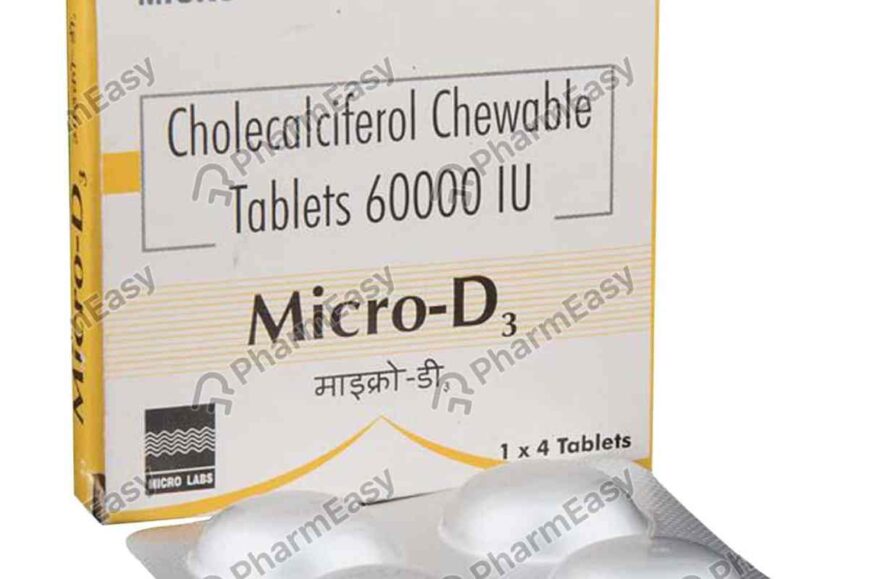Cholecalciferol Granules 60000 IU Uses? Vitamin D3; a type of fat soluble vitamin, referred to as cholecalciferol is essential in taking care to ensure that the body, immunity and bones remain in good health.
It is most commonly an oral tablet of cholecalciferol, especially in large doses, 60,000 IU (International Units) that one takes as a medication in attempts to rectify the Vitamin D deficiencies and its health complications.
. This paper tells us about the different applications of the cholecalciferol tablets (60,000 IU), their advantages, dosage, possible side effects, and precautions so as to have a safe and effective dosing schedule.
What is Cholecalciferol?
Cholecalciferol is a type or form of Vitamin D which is naturally produced and synthesized by the human body during the exposure to sunlight or present in various foods and supplements. The large amount of Vitamin D supplement, 60,000 IU, is typically used in temporary manner since it is prescribed as a remedy to fatal cases of Vitamin D deficiencies.
1. Therapy of Vitamin D Deficiency.
Diagnosis determined by low treatment of either 25-hydroxyvitamin D (25 ( OH )D ) less than 20 ng/mL (ng/mL). This loss may leave one feeling tired, with pain in bones, muscle fatigue and emotional issues. Such diseases as rickets in children or osteomalacia in adult persons can be caused by more severe or chronic deficit. The large amount of cholecalciferol is used to restore vitamin D in the shortest possible time with the expectation of achieving the levels and are usually added to some lower level.
2. Management of Osteoporosis
Low level of Vitamin D is normally linked with weakened bones and high susceptibility to fractures due to osteoporosis. The cholecalciferol pills enhance the absorption of calcium in the small intestines, thus strengthening and strengthening the bone mineralization. They are normally administered with a degree of calcium supplements in patients who have osteoporosis or are at risk of developing osteoporosis, such as postmenopausal females or the elderly.
3. Rickets Prevention and Treatment.
Rickets is a disease that is caused by an extreme lack of Vitamin D, making bones and the skeleton soft and weak, with their deformity. The therapy with Cholecalciferol 60,000 IU tablets is premised on the necessity to replenish the Vitamin D amount, which will further stimulate proper growth of the bone and rule out the possibility of further complications.
4. Support for Bone Health
Owing to its properties in regulating calcium and phosphorus metabolism, vitamin D can be regarded as very important to maintain the health of the bones. The patients who have poor bone density or are at risk of a bone fracture take the prescribed cholecalciferol tablets in order to make sure that the bones are properly mineralized and to avoid complications with the disorders of the bones.
5. Treatment of Hypoparathyroidism.
When the parathyroid glands fail to produce parathyroid hormone (PTH) necessary it is known as hypoparathyroidism which is a condition that leads to the level of calcium in the blood to be low levels and the level of phosphorus production thereafter being increased in the blood.
Benefits.
Quick Remedy of a Shortfall: Vitamin D is in a high form of 60,000 IU pills, which implies that they can be used on short notice to restore the deficit of vitamin D at short notice, especially in severe cases.
- Comfortable Dosage: These pills are usually administered either once a week or once a month, which is an assurance to the patient as far as convenience is concerned, as compared to the daily low-dose supplements.
- Increased Bone Strength: Cholecalciferol improves bone strength by increasing calcium absorption, which reduces bone fractures and osteoporosis.
- Immune Process: Beyerset Vitamin D is able to assist the immune system, and this can help reduce the occurrence of diseases and infections.
- Flexibility: These tablets can be applied and useful to a wide range of disorders, which include bone disorders and immune-related issues, and can be regarded as a versatile way of treatment.
Dosage and Administration
The dosage of cholecalciferol of 60000 IU in the form of tablets varies by the severity of the deficiency, and also the age of the individual patient, as well as other related complications. A common regimen includes:
- Severe Deficiency: 1 tablet (60000 IU) per week during 8 -12 weeks and continued at 1 1000 -2000 IU/Es/day.
- Maintenance Therapy: 1 daily to keep Vitamin D levels optimum, 1 tablet quarterly. Special population Dosage alterations may be needed in children, pregnant women, or kidney or liver issues.
These tablets are most of the times consumed with food orally, where Vitamin D should be combined with food to aid its absorption since Vitamin D is a fat-soluble vitamin. Instructions that a healthcare provider provides to people should be paid great attention to, as the risk of toxicity can occur in the case of overdosing.
Potential Side Effects
Although the usage of cholecalciferol is not necessarily a very dangerous activity provided that the usage is conducted within the range of the recommended amount, it has its side effects in cases of a drug overdose, and they are:
- Hypercalcemia: An overabundance of calcium in the blood already at this stage manifests itself to the extent of nausea, vomiting, constipation, or kidney stones.
- Pathological conditions: the excess of calcium in the urine source may destroy the kidney in the long term..
- Fatigue and Weakness: The possible outcome of an overdose is fatigue, confusion, or the inability to move muscles.
- T Soccer Rare Allergic Reactions: There are people with skin rash or hypersensitivity.
Precautions and Contraindications.
- Medical Supervision: Cholecalciferol should not be administered in abundance unless it has been under an oversight of a physician who has prescribed the medication; it is particularly significant in the case of kidney patients, hypercalcemia, and sarcoidosis.
- Unspecified: Non drug effects. The medications that may disrupt the metabolism of Vitamin D include the corticosteroids, anticonvulsant medications, and slimming pills.
- Pregnancy and Breastfeeding: means of giving medical consent. During pregnancy, these means must have medical consent before the medical prescription of high-dose supplements.
- Not excess Vitamin D: It is noteworthy to take caution of the overdose, as one may turn toxic due to excess consumption of Vitamin D.
Cholecalciferol 60,000 IU Tablets: Who should take it?
The tablets are applicable in:
This is due to the fact that people diagnosed with Vitamin D deficiency undergo blood tests.
- Bone illnesses like osteoporosis or rickets in the clients.
- Those not exposed to much sun, such as the elderly or those in areas that are not characterized by enough sun.
- Lack of malabsorption issues or chronic illnesses that interfere with the Vitamin D metabolism.
The medically supervised patients with such conditions as hypoparathyroidism or CKD.
Diet and Lifestyle Intervention.
Though cholecalciferol in the form of tablets is the effective one, it also may be used with the addition of lifestyle changes to enhance its efficacy:
- Exposure to sunlight: The beneficial effect of experienced natural Vitamin D levels can be increased with a reasonable exposure to the sun (10-30 minutes/day in all latitudes and depending on the skin type), helping to increase the level of natural Vitamin D.
- Dietary: consume Vitamin D-containing foods, that is, fatty fish (salmon, mackerel), the need of eggs and fortified milk, and mushrooms.
- Physical activity: The exercises against bones should be of bearing type to supplement the Vitamin D in this case.
What Are Cholecalciferol Granules 60000 IU?
Cholecalciferol 60000 IU is a high dose of vitamin D3 supplement that is generally administered to correct and prevent vitamin D deficiency. Vitamin D exists in a natural form known as cholecalciferol where the body manufactures this vitamin when a person is exposed to sunlight. Nonetheless, because of the indoor lifestyles, pollution, use of sunscreens and food deficiencies, several individuals, particularly in India, lack natural access to vitamin D.
These granules are normally in form of sachets that are added with milk or water and then taken. Since its dosage is high (60,000 IU), they are usually administered once a week or once a month, and the correct usage will be determined by the medical counsel.
Cholecalciferol Granules 60000 IU are used in the following ways.
Vitamin D Deficiency: Treatment.
The more popular application of cholecalciferol granules 60000 IU is a regularization of vitamin D deficiency. Deficiency of vitamin D may result in muscle weakness, fatigue, general bone pains, and frequent infections. Supplementation aids in replenishing normal vitamin D levels and avoids long term complications.
Supporting Bone Health
Vitamin D plays a critical role in calcium absorption. Without enough vitamin D, calcium cannot be effectively absorbed from the diet, even if calcium intake is adequate. Cholecalciferol granules help:
-
Strengthen bones
-
Improve bone mineral density
-
Reduce the risk of fractures
-
Support proper bone growth in children
This makes them especially useful for older adults and postmenopausal women.
Important Words Related to Cholecalciferol Granules 60000 IU
| Term | Meaning |
|---|---|
| Cholecalciferol | Natural form of vitamin D3 |
| Vitamin D Deficiency | Low levels of vitamin D in the body |
| IU (International Units) | Measurement used for vitamins |
| Calcium Absorption | Process of absorbing calcium into the body |
| Osteoporosis | A condition causing weak and brittle bones |
| Osteomalacia | Softening of bones in adults |
| Rickets | Bone disorder in children due to vitamin D deficiency |
| Hypercalcemia | Excess calcium in the blood |
| Bone Mineral Density | Strength and thickness of bones |
| Fat-soluble Vitamin | Vitamin that dissolves in fat, not water |
Advantages and Disadvantages of Cholecalciferol Granules 60000 IU
| Advantages | Disadvantages |
|---|---|
| Effectively treats vitamin D deficiency | High dose may cause side effects if misused |
| Improves calcium absorption and bone strength | Not suitable for daily use |
| Helps prevent osteoporosis and fractures | Risk of high calcium levels (hypercalcemia) |
| Supports muscle strength and reduces cramps | May cause nausea or stomach discomfort |
| Boosts immune system function | Requires medical supervision |
| Convenient weekly or monthly dosing | Overuse can harm kidneys |
| Faster absorption compared to tablets | Not ideal for people with kidney disease |
| Easy to consume (no swallowing pills) | Taste may be unpleasant for some users |
| Helpful in rickets and osteomalacia | May interact with certain medications |
| Useful for elderly and indoor lifestyle individuals | Not recommended without blood tests |
Ends
Cholecalciferol 60000 IU is an efficient, popular, and convenient treatment of vitamin deficiency, bone diseases, muscle ailments, and immune system support. They are used to alleviate good health and life quality when properly consumed with the advice of the doctor. Nevertheless, due to its high-dose supplement, the dosage and period play very important roles in preventing side effects.


